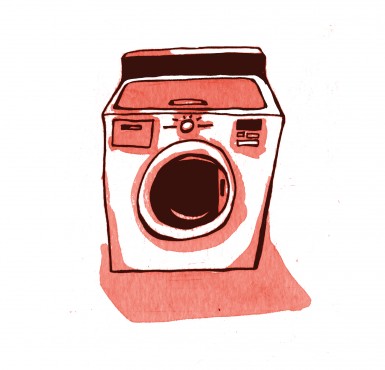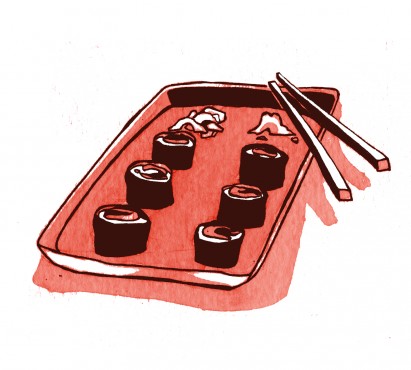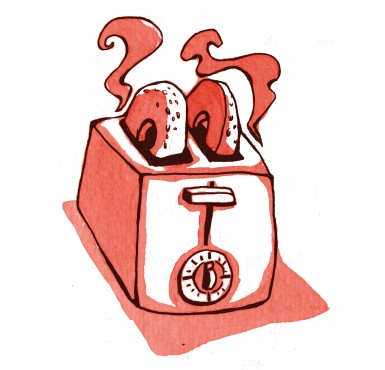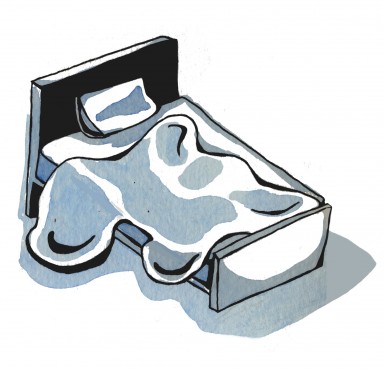My relationship with classrooms has never been great; I draw comics when I should be paying attention, I usually don’t like group projects, and my knee always does that thing where it bounces up and down. As I got older and started to take courses about subjects I was actually interested in, I thought my general boredom and frustration in class would change, but instead, I was getting angry.
It wasn’t just a general feeling of agitation brought on by boredom. It was like that intense, road-rage anger that wound-up people experience when they lose their cool over a dented bumper. But why was I fuming in a class I signed up and paid for?
To top it off, my anger in the classroom was punctuated with cycles of euphoric highs and crushing lows. I’d go from angry to happy to sad in a very short period of time. It was like someone found my universal emotion remote and couldn’t decide on a channel.
“Just pick a station,” I would tell my brain.
“It’s not that hard, there’s nothing good on anyway.”
My school work started to suffer, and as this disturbance crept into other parts of my life, I went to my doctor confused and emotionally exhausted. I was quickly referred to a psychiatrist to get a proper diagnosis.
She took a look at my medical history and asked me a series of questions about my personal and family life. Yes, my mother has bipolar disorder and my father has depression. Yes, I have extreme ups and downs. No, I can’t sit still in class. No, I don’t think music on the radio is being played to deliver a secret message from God.
As I sat in her office reading her hand-stitched Hippocratic Oath, I secretly hoped not to have the same diagnosis as my mother. Don’t get me wrong, I love my mom, but I wasn’t ready to go down the road of extremely long lows and highs paired with years of misdiagnosed medications, periods of anger, and those constant reminders to wear a sweater. I was diagnosed with ADD instead, which filled me with relief. Neither of my parents had it, so I felt separate from any possible genetic burdens they could have given me. I was told by UVic’s disability resource centre that I was a gifted individual that thought outside the box and should be praised for my creativity.
Despite the new medication, sitting in class was still a struggle. More importantly, my anger in class did not subside — though my new excuse for truancy cheered me up a bit. The medication improved my energy level during the day and my ability to focus on daily activities that didn’t involve sitting in class, such as writing papers from home.
As I continued my medication into the summer, I started to feel like myself again, better even, but what I didn’t know is that I had just hopped into the front seat of a roller coaster ride in Brain Chemical Tycoon 3000. You know, the one at the Mental Health Theme Park with the big dip and questionable architecture. I could feel my brain and energy levels rising beyond my control as I unknowingly reached the first plunge of my metaphorically awful, over-priced roller coaster ride.
Turns out, I had been misdiagnosed. As a future meeting with a different psychiatrist would tell me, I was actually bipolar disorder type II, rapid cycling. Now I hear you on your end saying “Wait, there is more than one type of bipolar disorder? What is all this cycling nonsense, are you a washing machine?”
Well, don’t scare the people around you by talking to yourself, but yes, there are two types in the realm of bipolar. Bipolar itself is part of a larger category of mood disorders defined by a disturbance of mood, along with feelings of excessive happiness (mania) or extreme sadness (depression) not caused by any other physical or mental disorder, such as schizoaffective, major depressive, and anxiety disorders.
In comparison, those with bipolar type I alternate between manic and depressive episodes, while those with type II alternate between depression and hypomania. Rapid cycling means that the person experiences four or more of these mood episodes within a 12-month period.
[pullquote]I wished I could have kept strictly the ADD label; bipolar disorder doesn’t seem to have the same cheery, predictable ring to it.[/pullquote]
When I explain bipolar disorder to people, they understand the mood swings and depression, but they don’t really know what exactly mania or hypomania is. So let’s start from the beginning: both of these words are used to describe the mental highs people with bipolar disorder have. People experiencing mania or hypomania deal with symptoms like abnormally elevated or irritable mood, inflated self-esteem or grandiosity, decreased need for sleep, pressured speech (being more talkative or talking very fast), racing thoughts, distractibility, increased goal-directed activity, restlessness and/or excessive involvement in pleasurable activities that have a high potential for painful consequence. Mania and hypomania are similar but have an important difference: the severity of the symptoms.
An old friend with bipolar type I used to have periods of mania where he thought he was a god while having visual delusions. The weirdest thing I’ve ever done during a hypomanic state was buy a huge bag of buttons from Value Village and spend the next five hours sorting them by size and colour, or that time I spent three days intensely researching trips to Japan because of a really good Japanese meal I had a day prior. This is not to say one is more or less important than the other, but there is no denying their difference of severity and experience.
In the past, I have found it difficult to describe what hypomania feels like to those who haven’t experienced it before, but the best I can do is this: imagine you are conducting a perfect orchestra in furious, passionate motions. They are playing a piece you wrote, the most beautiful song you have ever written. You love it, and you know the audience loves it too. You are a mix of joy, angry passion and a certain level of insanity that comes with artistic creation. The music sounds extremely good; it fills you in such a personal, spiritual way you can play it on repeat for days while being amazingly creative, and feel like you are extremely funny and charming. It gets you moving, it gets you motivated. Learn the guitar in a week? Let’s go. By the way, I also have really great ideas on how to fix our government; I’ll tell you about it! Call me about it anytime; I’ll be up all night painting while writing a sonnet anyway. It’s the runner’s high without the running and it lasts much longer.
If hypomania came in a bottle, the list of side effects would be long. When you are hypomanic your brain goes so fast that even you can’t keep up with it. You start to push other people away from you as they can’t seem to keep up or understand your ideas which you deem to be brilliant. “Keep up or leave me alone” becomes your motto as you feel increasingly irritated and isolate yourself in your home, which is filled with an uncountable number of unfinished projects. All the while, you are being bombarded by thousands of creative thoughts that refuse to leave as you unsuccessfully attempt to sleep. During my non-medicated hypomanic phases, I have tossed and turned until 2:30 a.m. as my brain continued to give me humour material or poetry that I refused to write down. When you’re hypomanic, your brain doesn’t care if you have a job to go to the next day.
[pullquote]If hypomania came in a bottle, the list of side effects would be long.[/pullquote]
Hypomania also leads to bad choices. Excessive shopping, gambling, substance abuse and increased sexual activity are common among those experiencing mania or hypomania. It’s like your 18-year-old self has taken over your brain and wants to make up for all the potential party years lost when you grew up and started thinking through your actions. These poor decisions can affect your job, your bank account, or your relationships. This is partially why describing my hypomania is extremely difficult; displaying this part of me to anyone feels like an exposure of something extremely deep and personal. It’s admitting that, for periods of time, I want to do everything without limitations, with no rules or regulations, backed by high levels of mixed passion and anger. I want to party, drink, and stay up all night creating great works of art I can look back on. It’s admitting that I experience a level of something that society might call insanity, or extreme irresponsibility.
Insanity and irresponsibility seem to co-exist, like when a mother yells at her child to stop running in traffic followed by the rhetorical question “Are you insane?” These symptoms of hypomania and mania explain why people with bipolar disorder don’t want to get medicated, or get misdiagnosed with simple depression as they seek medical help only when they are low. It’s easy to understand their motives; why mess with something that gives me energy and creativity? Even if that good thing comes with a few side effects like anger and insomnia? But, what goes up must come down, and eventually depression sets in.
The day it all came crashing down for me was extremely literal, which suggests to me that the universe has a sense of humour. That summer day, I was extremely hypomanic and doing many things at once. I had put bagels in the toaster and ran upstairs to grab my laundry. I raced back downstairs, but lost my step, causing me and my laundry to tumble down a long flight of hard, wooden stairs. When my painful journey was over, I lay on my back hearing only my breathing until I was interrupted by the sound of bagels popping from the toaster.
After dragging myself across the floor to the nearest telephone and having the paramedics break into my house, I was diagnosed with a single compressed vertebra and a few bruised ribs. In the beginning, I felt extremely lucky, but as I lay in bed for the next week a level of depression I had never experienced before crept in. I soon found myself using my now-healing back injury as an excuse from classes and social activities.
Depression after a long stretch of hypomania is like hitting a brick wall while running at full speed. It leaves you to slog through your tasks (if you can get them done at all) hoping no one notices how awful you feel. You want to sleep because it’s easier than being awake, physically and mentally. So you stay in bed, surrounded by your scattered guitar lesson books and half-finished paintings and sonnets while debating about whether the world needs you around or cares about your presence. With feelings like this, it’s easy to see why people who have bipolar disorder are also at high risk for suicide. When you’re low, you feel like you are being drowned by negative thoughts and feelings and that there’s nothing you can do about it. Every helpful option (take a walk, be with friends) seems too scary or complicated to implement. People with bipolar disorder are also at a high risk to self-medicate with alcohol or drugs, which raises their risk of suicide. I have never attempted to end my life, but I can admit that in the past I have used substances to quiet the noise in my head—sometimes you just need to make your brain stop.
After a while, I was finally able to get myself out of bed and go back for further psychiatric evaluation. I was then diagnosed with bipolar disorder type II, rapid cycling, and prescribed some anti-psychotic medication with scary side effects listed in a 10-page document. With my new diagnosis came a shift of tone from my disability service advisors. They went from discussing my ability to be creative and think outside the box to simply managing my mental highs and lows. I wished I could have kept strictly the ADD label; bipolar disorder doesn’t seem to have the same cheery, predictable ring to it. After my diagnosis I sat outside the doctor’s office and cried; I felt defeated. I blamed my mother, I blamed myself. I feared what others would think. Would people treat me differently? What if I couldn’t hold down a job? How hard was this going to be?
The short answer to the last question is that, so far, it has been pretty hard. I struggle with the monotony of work, keeping stable relationships, and maintaining plans with friends. I always joke to myself that I don’t go to the gym because dealing with a brain that is constantly producing different emotions is enough exercise already.
Recently, I came out of a deep depression after not taking my medication for a month and a half. Being off my meds felt great at first, but like a frog sitting in water as it slowly boils, I didn’t realize my emotional stability was changing. In the end, when my depression hit, it was the worst I ever felt. Many will think the desire to be med-free is stupid and question why on earth it’s so hard to take a pill three times a day, but it’s more complicated than that.
[pullquote]Because it’s in your brain, you should be able to think through the problem. This is about as helpful as trying to drive your car with a broken engine to the mechanic.[/pullquote]
Because life has a sense of humour, people with bipolar disorder also have trouble with something called medication adherence—the ability to take their medication on time and constantly. It’s a huge issue, with rates of nonadherence hovering between 30 and 54 per cent (depending on the study). Even now, a year into my diagnosis, I struggle to take my medication all the time.
It’s not just about the unwanted side effects (weight gain, increased appetite, getting my blood tested to make sure my liver isn’t failing), it’s the idea that you are admitting defeat by not being able to fix your own brain through thinking positive and just feeling better. Even when I confided in my medicated mother that I wasn’t taking my medication anymore, her first response was, “Good for you!” During my last deep depression, I started to reach out to a friend by telling them how depressed I felt. Their instant response was, “Oh, well don’t be sad!”
Although their intentions were well-placed, this is the kind of stigma we have put on mental health: because it’s in your brain, you should be able to use your own brain to fix the problem. This is about as helpful as trying to drive your car with a broken engine to the mechanic. I believe that the first step is opening up. I’ve become a bit more open about the fact that I have bipolar disorder; in fact I am using this article as the next step in coming out.
Oscar Levant once said, “There’s a fine line between genius and insanity,” suggesting that those who offer a different view of things, either through music, art or inventions, are different themselves. I still have yet to be able to sit in class, but I have accepted that perhaps it is just part of who I am. I might think and learn a little differently from the majority, but I know that makes me special. As an aspiring writer and producer for animated television, my bipolar may be my aid instead of my burden. After all, I am different, not just ill, and my bipolar label is not all that defines me. I am also an artist, a friend, a woman, and a human being. But this pride and understanding has to come with the knowledge that being properly diagnosed is the first stage of taking control of the ups and downs you feel. For me, they haven’t gone away 100 per cent, and I doubt they ever will, but through medication and cognitive training, I am slowly learning to level out. Without proper medication, I was lucky to get away with just a few bruises and some sad days, but the occasional ache in my rib reminds me of the damage hypomania can do to a person if they’re not careful.












